Tax season is here again but it doesn’t have to be a nightmare. Sort out your crypto taxes with Crypto Tax Calculator, a software supporting 300,000+ currencies across various L1s and L2s.
Dear Bankless Nation,
While many see blockchain gaming as a major key for mass crypto adoption, it’s clear the current state of the space is pretty rudimentary. There’s more to be done and more to be brought on-chain.
Today, we take a look at the fluid state of blockchain gaming and what exactly permissionless innovation can do for the average gamer.
– Bankless team
Kraken, the secure, transparent, reliable digital asset exchange, makes it easy to instantly buy 200+ cryptocurrencies with fast, flexible funding options. Your account is covered with industry-leading security and award-winning Client Engagement, available 24/7.

Bankless Writer: Donovan Choy, Bankless Editor
When Ethereum is finally mainstream in the year 2087 and the Fed is no more, historians will trace crypto’s origins back to the fateful moment in 2011 when Blizzard nerfed the “siphon life” spell on Vitalik Buterin’s World of Warcraft character (thx blizz!).
As the story goes, that opened 15-year-old Vitalik’s eyes to the “horrors of centralized services” and thus Ethereum was born, finally putting the madness of centralized video games to an end.
Or that’s where we’re headed at least.
Unfortunately, most existing blockchain games would still be subject to the above case of censorship, despite the snazzy promises of “permissionless interoperability” and “true ownership” that plaster their marketing pages.
Let’s backtrack for a second and recall the purpose of a blockchain.
Blockchains serve to facilitate a shared consensus on a distributed database. People disagree — it’s why whole crypto communities have gone to great lengths to perform chain splits. Forking realigns consensus between irreconcilable differences.
So why build games on blockchains at all?
The same reason: people fundamentally disagree about how gaming universes should be built, just as Vitalik disagreed with Blizzard’s decision to nerf his beloved warlock. The true promise of games on a blockchain then, is to enable split gaming communities to resolve their differences.
The problem is that most blockchain games fall short of this mark. Games like Axie Infinity or CryptoKitties are games that are minimally on-chain. Their assets exist as on-chain data, but the game’s fundamental logic (the rules of the game) and state (the history of in-game actions) exist off-chain on a centralized game server.
Sure, your Axie NFTs and tokens exist forever as a piece of data within an immutable smart contract, so long as you keep your private keys safe. But should Sky Mavis, the company behind Axie, shut down — so will the value of your Axie assets. Ownership is more than simply securing a piece of data in your wallet. Ownership is also the power to control and have a say over the context i.e., the rules of the game, of where that data sits.
The financial value of these assets is completely dependent on Sky Mavis’s ability to successfully deliver the Axie Infinity ecosystem as a commercial product. They’re advertised as web3, but more akin to web 2.5, because players have little control over the underlying rules of the game which are off-chain and centrally planned.
How might one begin to build a truly uncensorable and unstoppable blockchain game? As per Gubsheep’s The Strongest Crypto Gaming Thesis:
-
The logic and state of the game is on-chain. The rules of the game – how you move, fight, harvest and consume – should be embedded as rules in open-source and on-chain smart contracts
-
All game data is on the blockchain, so it is interoperable.
-
The game is client-agnostic. If the core devs disappeared tomorrow, players do not have to rely on them to continue playing the game; people in the community can create their own clients that sends the players’ moves on-chain
When the above are fulfilled, a few important things begin to happen.
With the game’s logic on-chain — first, the gaming world achieves permanence and continues to exist even if the company goes bankrupt or abandons its development, the same way DeFi protocols continue to run perpetually. As Ronan Sandford puts it, on-chain games offer “reality independence”.
Second, the door is opened to permissionless innovation. Any player can creatively “mod” the game by introducing second layer rules (Curio calls them user-generated logic) in the form of smart contracts that “refer” to the base game rules (i.e., the “digital physics”).
Maybe this sounds confusing, but it isn’t – this is simply DeFi composability 101, where devs construct new protocols on top of the code of existing protocols, permissionlessly.
As long as second layer rules do not violate the underlying base rules, they are permissible. It’s worth noting that second layer rules are not the same as add-ons/mods in existing games which alter only your personal user interface and local experience; they are embedded in on-chain smart contracts that affect the shared virtual gaming experience with all other players.
For instance, a fully on-chain chess game that is determined to retain the classic movesets of chess pieces would enshrine the classic rules in the core dev’s smart contracts as non-negotiable and unalterable. Knights can only move in an L shape and bishops can only traverse diagonally.
However, anyone can create new second layer rules on top of those unalterable digital physics. They can be a token, a guild system, a RPG-like questline where instead of capturing your opponent’s King to win the game, you would win by moving your King to the opposite end of the board. You could introduce a trading system with an accompanying token currency that buys back dead pieces, or trade pieces with my opponent. Anything goes as long as it’s allowed by the logic of the base rules.
In an on-chain game, assets are not bound to one strict set of game logic, and are maximally interoperable in the broadest sense of the word. They each often exist as just another token in a continually expanding gaming universe, the same way thousands of tokens in DeFi compete against another based on their own rulesets i.e., tokenomics models.
In contrast, Epic may allow Fortnite gaming assets to be “interoperable” within its library of games, but they are only interoperable insofar as devs allow it to be. The same is true for gaming assets in web 2.5 blockchain games.
This takes us to the final piece of the puzzle: incentives. Traditional games have many highly vibrant modding communities, but they operate at the mercy of core devs. Minecraft’s history provides the best example. As I wrote previously:
For many years, Microsoft used intellectual property laws that allowed Minecraft users to modify and create user-generated content, but prohibited them from selling officially licensed code for profit, effectively maintaining a gray economy of passionate fans that lived to serve them.
In economic terms, these are weak property rights for modders, and therefore weak incentives to create. As such, mods are typically maintained by enthusiasts and hobbyists operating out of altruism.
Fully on-chain games solve this. With on-chain games, player incentives to create mods are stronger as mods created are uncensorable and permanent creations (the aforementioned second layer rules) codified in immutable smart contracts. The rules of ownership that underlie any tokens, game mechanics, social institutions, or rules that players create within the game are fully within their control and not bound to an underlying set of permissioned game logic and rules. Most importantly, they are competing against other player-made creations within the gaming economy.
In the on-chain gaming world, core game developers therefore commit to tying their own hands around unilaterally changing the fundamental rules of the game. It’s what would save Vitalik’s World of Warcraft toon! Gone will be the days of gaming dictatorships.
Okay enough theory, now let’s look at some examples of on-chain games.
Dark Forest is perhaps the premier example of an on-chain game. Created by Gubsheep at the 0xPARC Foundation, Dark Forest is a space-themed multiplayer strategy game deployed on the Gnosis chain since 2019.
Dark Forest’s entire game logic and state is contained on-chain. There is no centralized server or database that processes the game’s actions or stores the game’s state unlike traditional online games today.
As explained, the magic of on-chain games lies in the emergent orders that can spontaneously emerge from players leveraging its on-chain properties. Dark Forest has no limit of such examples. Dark Forest players have created in-game marketplaces that allowed trading of in-game resources without the need for core devs to introduce a patch for a trading system or auction house.
Dark Forest did not come with a built-in guild system, so a group of players (DFDAO) took it upon themselves to construct their own permissionless, on-chain guild system through external smart contracts. This allowed many small players to coordinate and pool their resources in an entirely trustless manner, with the intent of becoming competitive on leaderboards that were dominated by experienced players. As documented on the DFDAO blog:
In round 4… we deployed The Astral Colossus, a smart contract player that enabled other players to play as a team giving [resources] to it. This eliminates the element of trust between players because all the code of what is happening is in a smart contract that you can read and know what it will do, making the process trustless and permissionless.
DFDAO also forked the Dark Forest game entirely onto a different chain. Their forked version, called Dark Forest Arena, introduced various new gaming modes. In any other MMORPG, all of these actions would be considered illegal, black market dealings or a “hack”. In an on-chain game like Dark Forest, everything was permissible and running on code.
Examples of community-led emergent orders can also be found elsewhere in OPCraft, an on-chain version of Minecraft on Optimism built by the Lattice team. In OPCraft’s early test launch, players created plugins to automate resource collection, chat with one another, teleport across the map, and change the color schemes of the world.
One player, named SupremeLeaderOP, created a communist Republic with an accompanying set of rules by deploying an on-chain smart contract. Any player that voluntarily joined the republic would give up all their existing possessions and have their inventories merged into a collectively shared treasury, as per socialist philosophy.
Of course, examples of emergent orders in gaming aren’t anything new. Eve Online players coordinated offline social alliances on Discord if gamemakers didn’t create an in-game guild tool. Everquest and World of Warcraft players developed informal social currency systems – “DKP” (dragon kill points) – to manage and reward players based on their time commitment to in-game raids.
What makes these creations different are that they are permissionlessly created and embedded on-chain thanks to the open composability of the game. Players in the OPCraft communist Republic had no idea who he was, but they did not have to trust him to hold up his end of the bargain.
In Conquest, a diplomatic strategy game on Gnosis Chain, players stake xDAI tokens to produce spaceships, form alliances and attack each other Civilization-style. Again, the ability to create on-chain smart contracts means that player alliances are bound by real value assets at stake to ensure players put their money where their mouth is, demonstrating trustless interactions between player alliances.
If on-chain games are so amazing, why aren’t they more widely popular?
The most obvious hurdle that on-chain games face is scalability. Sending every player action on-chain is computationally intensive, which is why most on-chain games are turn-based games and not on Ethereum mainnet. Immutable code that lives permanently on-chain also means that exploits arising from dev oversights will be hard to patch.
Permissionless gaming also entails opening the floodgates to opportunistic players and bots. Existing blockchain games like Axie and Pegaxy mitigate this to some extent with costly entry barriers, while traditional games deal with this via KYC methods and selective banning, but these centralized levers are not available to permissionless on-chain games.
In a way, the problems of on-chain games draw a striking parallel to imperfect, real world institutions that are hard to change due to social entrenchment and collective action problems (think the imperial system, or democratic politics). These problems must be confronted by both the community and core devs alike, finding entrepreneurial solutions and creative mechanism designs to curb bad behavior, rather than outright censoring them.
On-chain games still largely exist as a proof-of-concept. Devs are still trying to figure out the optimal ways to scale, and the terminology is scattered. Lattice calls it Autonomous Worlds, Bibliotheca DAO calls it Eternal Games, Etherplay calls it Infinite Games and Topology calls it “on-chain realities”. You get the idea.
The above are but a few examples of emergent orders in on-chain games but the possibilities are endless. Just like the open-source composability of DeFi enables tokens to be interoperable and sliced and diced in a variety of ways because the root of every dapp exists as a shared state on the blockchain, the same will be true for games that fully embrace the blockchain.
Spin up your own ERC20 token as an in-game currency. Form any social structure imaginable – religions, nations, factions – and put it on-chain. Write your own questlines with rewards or punishments in tokens and tie them to an immutable smart contract.
Calling this an “in-game economy” would be a misnomer because they are not siloed from the real world like in traditional games. These are real world value economies that blur the lines between creators and players. They exist permanently on the blockchain. They have the capacity to continuously evolve from an untold number of spontaneous decisions by private individuals to permissionlessly experiment with new ways of production and trade, providing limitless avenues for players to capture economic value.
I’ve been harsh on existing blockchain games in this article but it’s worth noting that web 2.5 games still offer stronger ownership rights than traditional games. Web 2.5 games at least avail to players a freedom of exit. Unlike traditional games where assets are protected as intellectual property and cannot be sold, players can sell their in-game tokens and be rewarded for their time.
However, the very thing that makes web 2.5 games better than their traditional counterparts is also what comes up short compared to fully on-chain games. Off-chain game logic deters the game from fully leveraging the potentials of blockchain technology. Only fully on-chain games seriously harness the human ingenuity that open and permissionless blockchain infrastructure allows.
Some of the greatest video gaming titles and genres have been the byproduct of emergent orders. They exemplify a common pattern: gaming enthusiasts and hobbyists were engaging in “fuck around and find out”. Both the wildly popular MOBA (Dota) and Tower Defense genres stemmed from creations in the Warcraft 3 custom game modding community. PUBG: Battlegrounds was originally a mod in the FPS shooter DayZ, which itself was a mod from another FPS shooter Arma 2. Counter-Strike was a mod from Half-Life, one of the 90s’ most wildly popular games.
On-chain games simply take that to the next level.
Special thanks to ludens, Ronan Sanford, guiltygyoza, lordOfAFew and cha0sg0d_ for providing useful comments on this article.
Subscribe to Bankless. $22 per mo. Includes archive access, Inner Circle & Badge.

Not financial or tax advice. This newsletter is strictly educational and is not investment advice or a solicitation to buy or sell any assets or to make any financial decisions. This newsletter is not tax advice. Talk to your accountant. Do your own research.
Disclosure. From time-to-time I may add links in this newsletter to products I use. I may receive commission if you make a purchase through one of these links. Additionally, the Bankless writers hold crypto assets. See our investment disclosures here.
Read More: newsletter.banklesshq.com

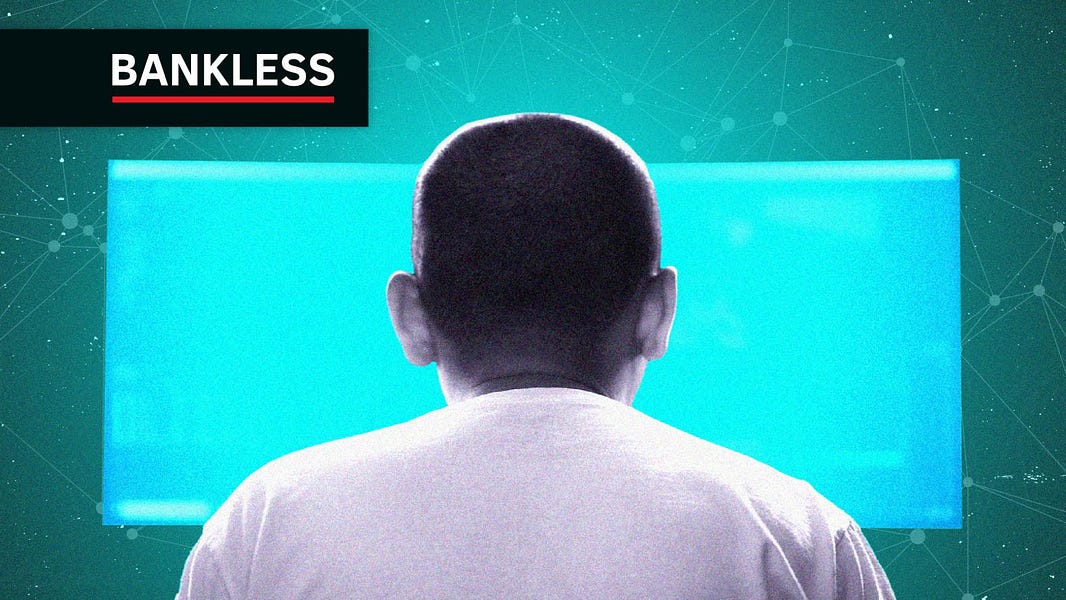



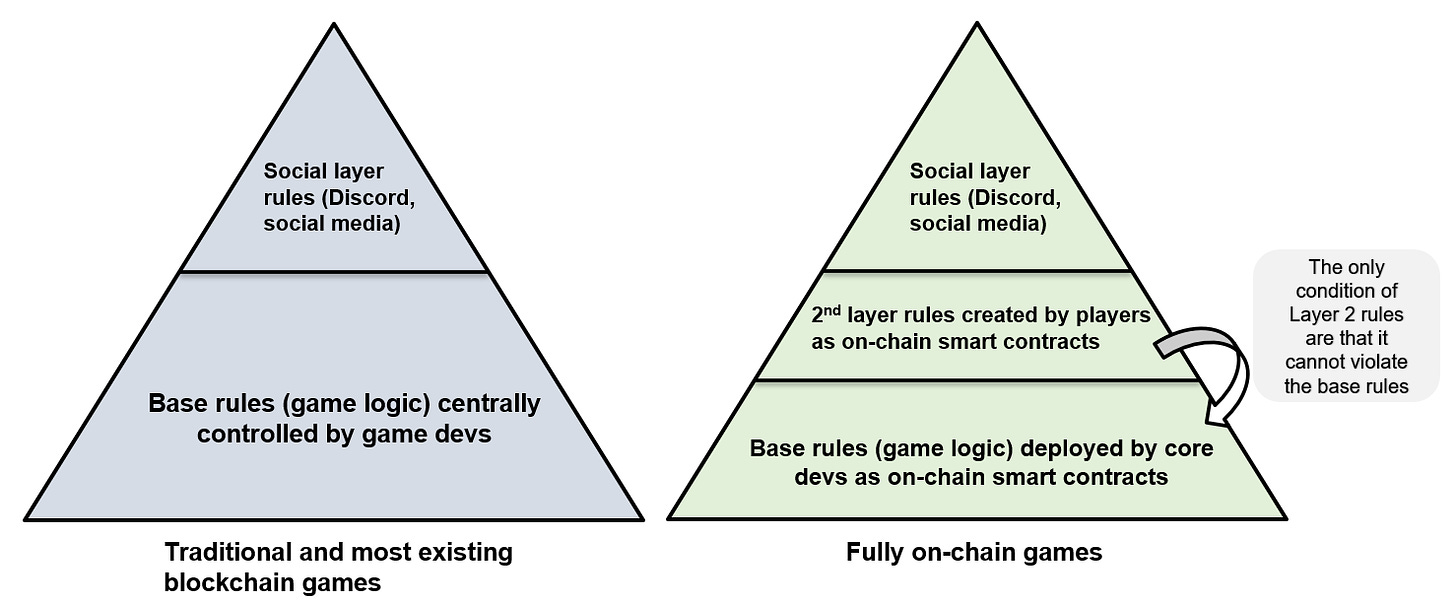

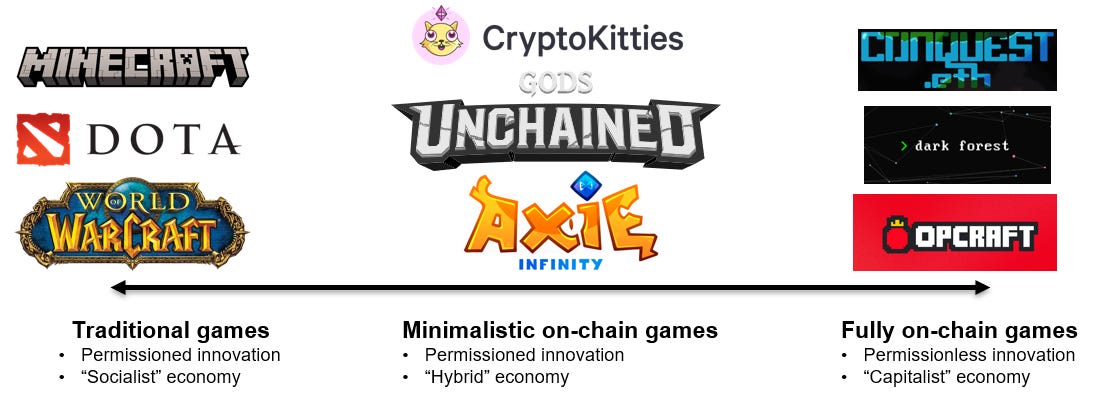
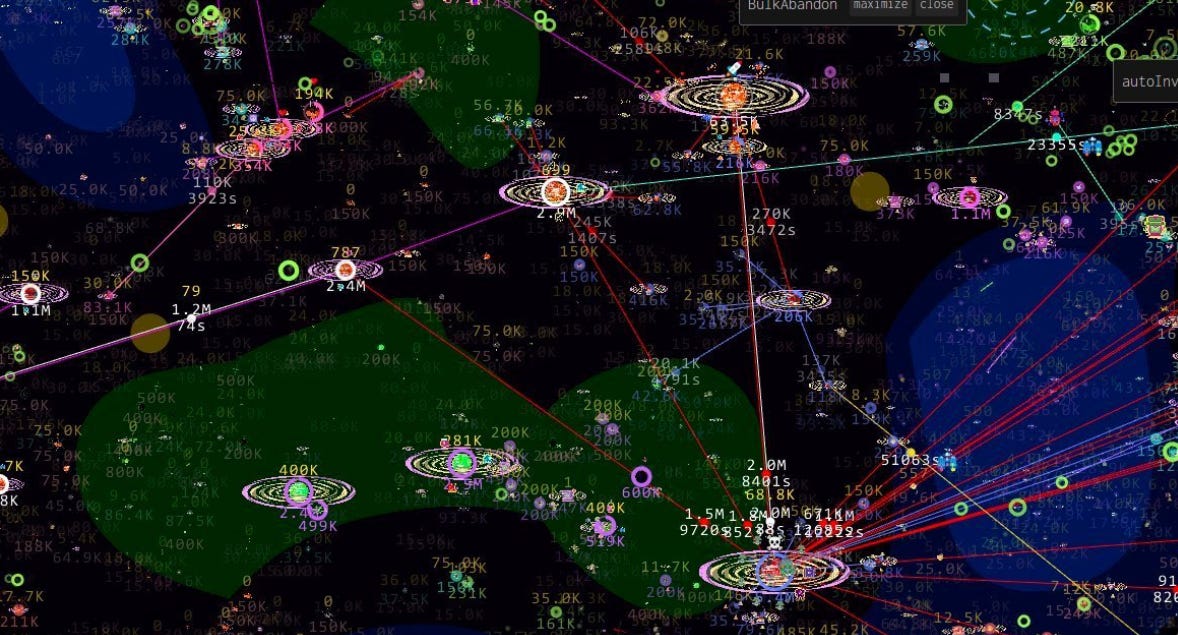
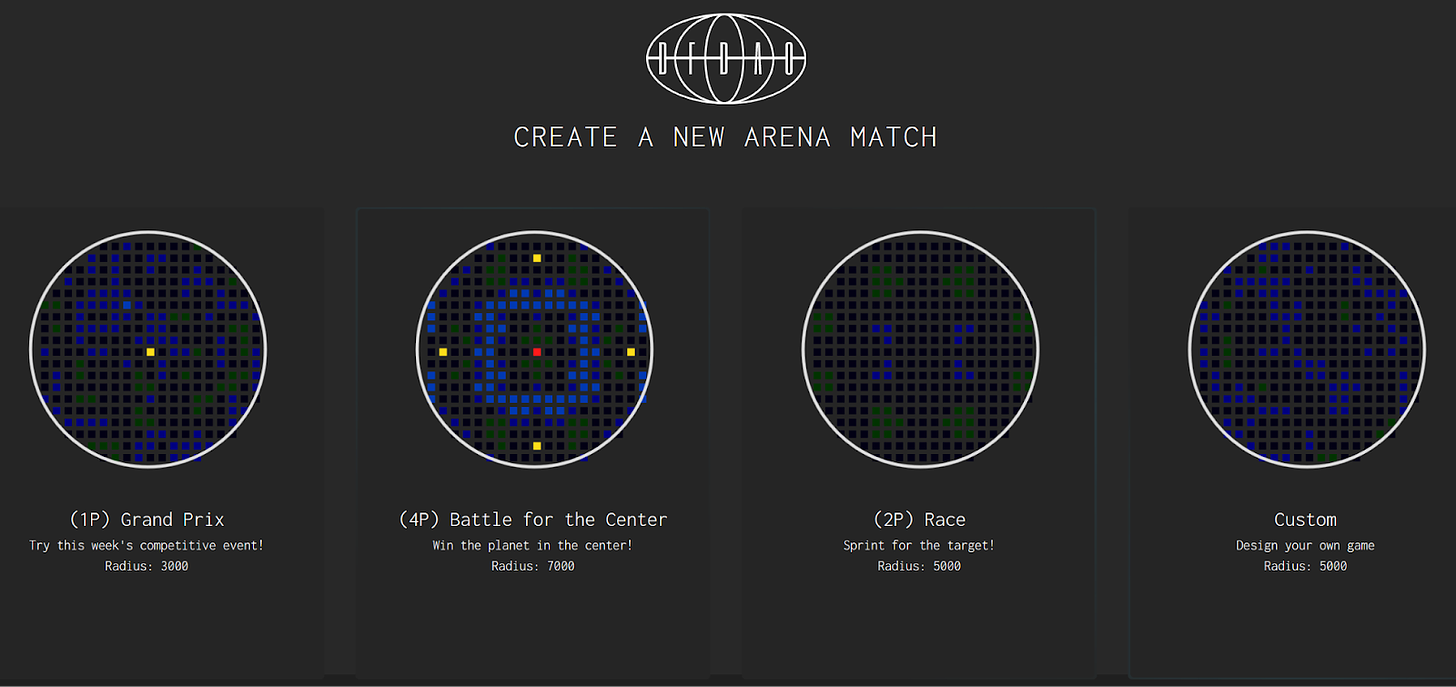
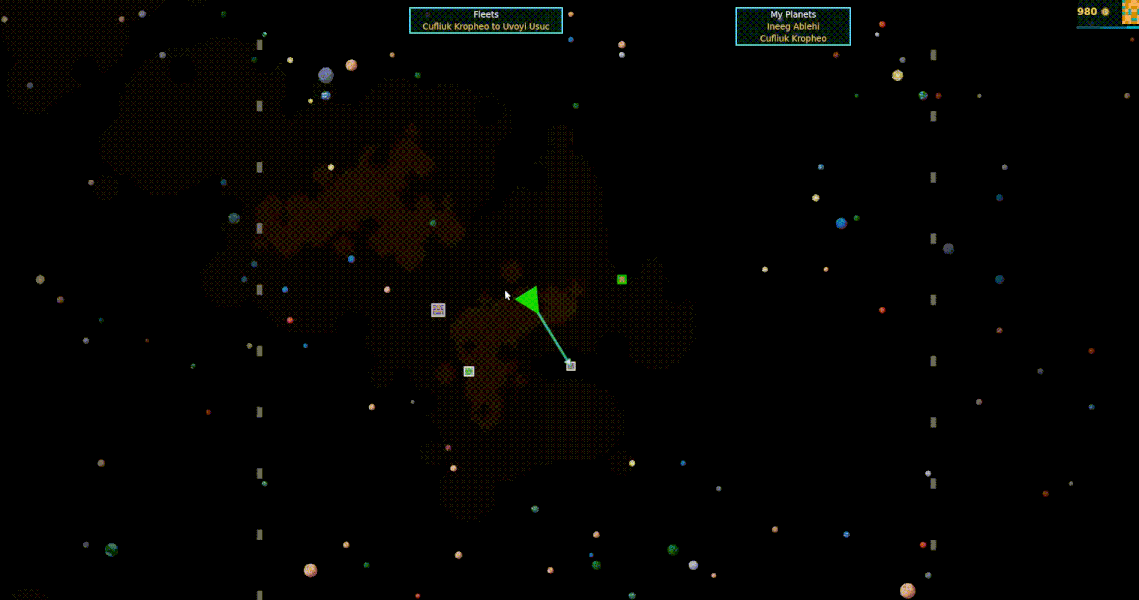
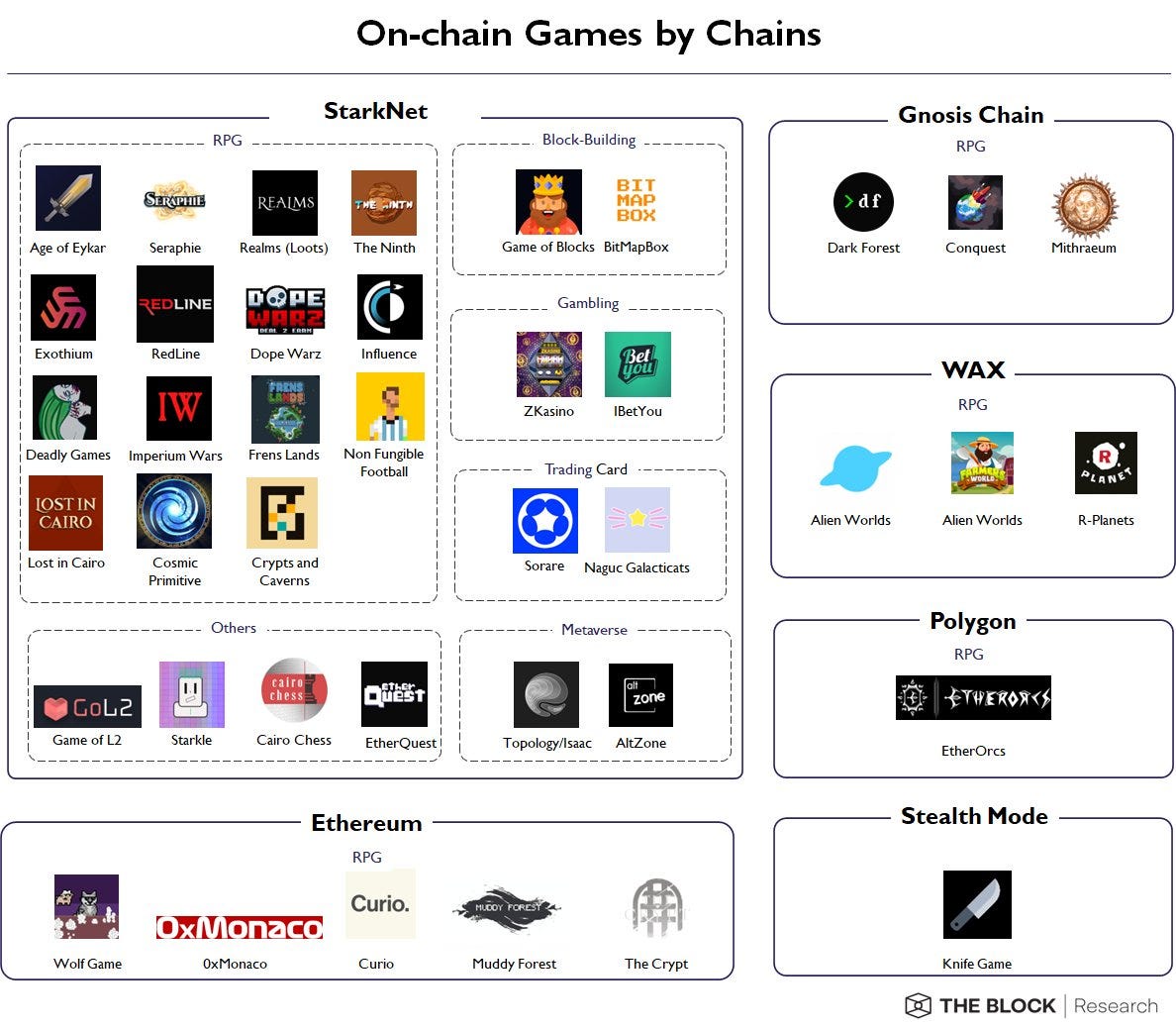










 Bitcoin
Bitcoin  Ethereum
Ethereum  Tether
Tether  XRP
XRP  Solana
Solana  USDC
USDC  Dogecoin
Dogecoin  TRON
TRON  Cardano
Cardano  Lido Staked Ether
Lido Staked Ether  Wrapped Bitcoin
Wrapped Bitcoin  Hyperliquid
Hyperliquid  Wrapped stETH
Wrapped stETH  Sui
Sui  Chainlink
Chainlink  Avalanche
Avalanche  LEO Token
LEO Token  Stellar
Stellar  Toncoin
Toncoin  Bitcoin Cash
Bitcoin Cash  Shiba Inu
Shiba Inu  USDS
USDS  Hedera
Hedera  WETH
WETH  Wrapped eETH
Wrapped eETH  Litecoin
Litecoin  Monero
Monero  Polkadot
Polkadot  Binance Bridged USDT (BNB Smart Chain)
Binance Bridged USDT (BNB Smart Chain)  Ethena USDe
Ethena USDe  Bitget Token
Bitget Token  Pepe
Pepe  Coinbase Wrapped BTC
Coinbase Wrapped BTC  Pi Network
Pi Network  WhiteBIT Coin
WhiteBIT Coin  Aave
Aave  Uniswap
Uniswap  Dai
Dai  Ethena Staked USDe
Ethena Staked USDe  Bittensor
Bittensor  OKB
OKB  Aptos
Aptos  Cronos
Cronos  NEAR Protocol
NEAR Protocol  BlackRock USD Institutional Digital Liquidity Fund
BlackRock USD Institutional Digital Liquidity Fund  Jito Staked SOL
Jito Staked SOL  Internet Computer
Internet Computer  Ethereum Classic
Ethereum Classic  sUSDS
sUSDS